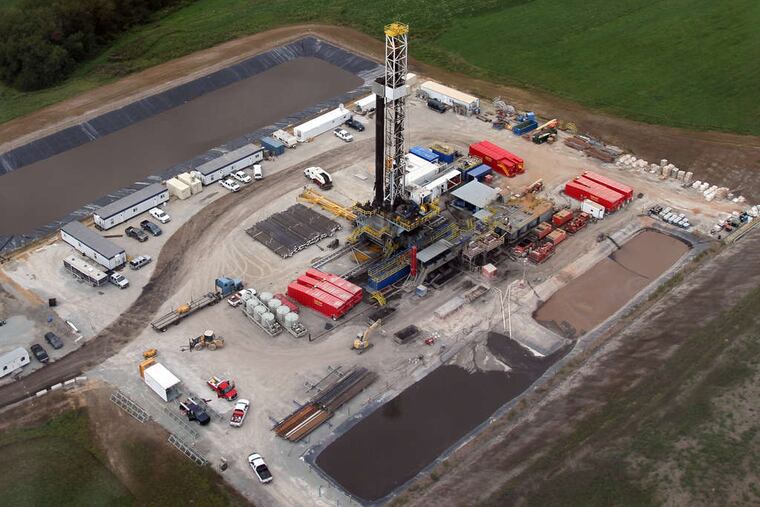Wolf's severance tax would set a minimum value on gas produced
Gov. Wolf's proposed severance tax on Marcellus Shale natural-gas production contains a unique feature that sets a minimum taxable level, guaranteeing that the state would capture its share no matter how low the gas price sank.

Gov. Wolf's proposed severance tax on Marcellus Shale natural-gas production contains a unique feature that sets a minimum taxable level, guaranteeing that the state would capture its share no matter how low the gas price sank.
The severance tax, dubbed the Pennsylvania Education Reinvestment Act, would set a minimum value of $2.97 per thousand cubic feet (Mcf) for all natural gas produced in the state, regardless of its actual sale price. Natural gas is currently selling at five Pennsylvania trading hubs at prices ranging from $1.23 per Mcf to $2.52 a unit.
The provision, included in the legislation introduced last week, addresses the question raised by tax opponents, who doubted that Wolf's proposed 5 percent tax could generate the promised $1 billion in revenue in a climate of depressed gas prices.
"They're basing it on an arbitrary price, whether the market bears that or not," said State Rep. Jim Christiana (R., Beaver), who called the tax plan "irrational."
"This is akin to someone that makes $40,000 having to pay taxes on $80,000 or $100,000 in income," said Kevin Sunday, a spokesman for the Pennsylvania Chamber of Business and Industry.
No other severance tax in the country sets a minimum price for producers, said Matthew Knittel, director of the state's Independent Fiscal Office, a nonpartisan agency that conducted an extensive review and comparison last year of extraction taxes across the country.
"That would be a unique feature," Knittel said.
Though a minimum price may be unusual for a gas-production tax, the Wolf administration based it on a similar concept included in the Transportation Act of 2013, which set a minimum fuel price on which the oil company franchise tax was applied to motor fuel.
"It was a feature of legislation that wasn't controversial," John Hanger, Wolf's policy secretary, said Monday.
The aim of establishing a floor price is "essentially to provide some certainty" about the revenue the state can anticipate, Hanger said. Most of the severance tax revenue would be committed to funding schools.
The proposal, modeled on West Virginia's severance tax, sets the tax rate at 5 percent of the gas price, plus 4.7 cents per thousand cubic feet of gas produced. At the floor price of $2.97 per Mcf, under which each unit of gas would be taxed a minimum 19.25 cents, the effective tax rate would be 6.5 percent.
Since the tax is fixed at a minimum, at lower gas prices, the effective tax rate would be higher. According to an SNL Energy analysis, the Marcellus Region volume-weighted average price for the last 12 months was $2.62 a unit. At that price, the effective tax rate would be 7.3 percent.
Hanger said the administration is aware of the depressed gas market.
"We are monitoring these market conditions," he said. "We are certainly open to conversations about modifications of the floor as we go forward."
Pennsylvania is the nation's only gas-producing state that does not assess a production tax. In 2012, the state created an "impact fee" that assesses a fixed amount for each well, now set at $50,000. That tax is expected to generate $225 million this year.
Wolf's proposed severance tax would allocate $225 million of revenue each year to be distributed according to the same formula used in the impact fee. The fee would be terminated.
Wolf campaigned last year to create a severance tax, and most polls show voters support it.
"This budget makes historic investments in our schools, and it starts with making gas companies pay their fair share," said Jeff Sheridan, Wolf's spokesman.
The Wolf tax proposal contains several other unusual aspects that could increase the effective tax rate above peer states. It does not allow for the deduction of gathering and processing costs, typically about 80 cents per Mcf, said Knittel, of the Independent Fiscal Office.
The proposal also would force producers to absorb the entire tax cost and not to pass any of the expense on to the landowners from whom they lease mineral rights.
If enacted, the law would declare illegal any leases that allow producers to reduce royalty payments to pay the taxes.
The Marcellus Shale Coalition, the industry trade group that is opposed to any severance tax, denounced the Wolf plan.
"If Pennsylvania is serious about capitalizing on these abundant resources that could rejuvenate our manufacturing base, this proposed legislation should be rejected out of hand, and the policy focus should shift toward developing markets for its efficient use," coalition president David Spigelmyer said in a statement.
215-854-2947 @maykuth